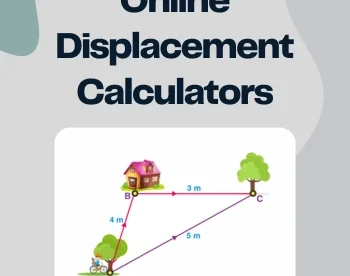5 Best Free Online RC Filter Calculator Websites
Here is a list of best free online RC filter calculator websites. RC or Resistor Capacitor filter is a type of passive filter that is used to filter electrical signals. RC filters are used in various applications like signal processing, frequency response shaping, and noise reduction. An RC filter has three main parameters namely Resistance, Capacitance, and CutOff Frequency. To calculate any one of the RC filter parameters, users need these online RC filter calculator websites.
Almost all these RC filter calculators can calculate all three RC filter parameters. To do that, users need to submit the values of any two RC filter parameters to calculate the third one. However, some of these websites can only calculate the Cutoff frequency value. Before starting the calculation process, users can also choose to change the SI units of all three RC filter parameters based on their requirements. Some of these websites also explain the workings of RC filters and show their diagrams. To help novice users, I have included the RC filter calculation steps in the description of each website.
These websites also offer additional tools such as RL Low Pass Filter Calculator, Inverting Op Amp Low Pass Filter Calculator, RF Power Density Calculator, and more. Go through the list to learn more about these websites.
My Favorite Online RC Filter Calculator Website:
digikey.in is my favorite website because it can calculate the parameters of both high-pass and low-pass RC filters. Plus, it can calculate all three RC filter parameters.
You can also check out lists of best free Online Crypto Tax Calculator, Online Bond Yield Calculator, and Online OPS Calculator websites.
Comparison Table:
| Features/Website Names | Works with both low pass and high pass RC filters | Can calculate all thre RC filter parameters | Shows calculation formulas |
|---|---|---|---|
| digikey.in | ✓ | ✓ | ✓ |
| omnicalculator.com | x (works with RC low pass filter) | ✓ | ✓ |
| learningaboutelectronics.com | x (works with RC low pass filter) | ✓ | ✓ |
| trance-cat.com | x (works with RC low pass filter) | x (Only calculates cutoff frequency) | x |
| muzique.com | ✓ | ✓ | x |
digikey.in
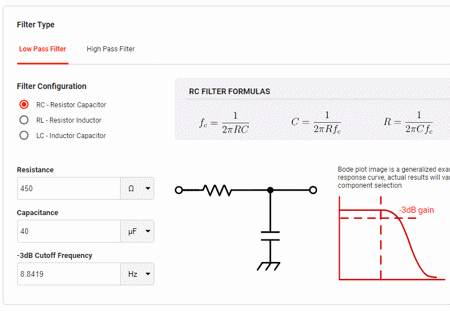
digikey.in is a free online RC filter calculator website. Users can use this website to calculate the Resistance, Capacitance, and Cutoff Frequency parameters of both Low Pass and High Pass RC filters. It shows the formulas used to perform the RC filter calculations. A handy RC filter diagram is also provided by it. Besides this, it can also be used to perform Resistor-Inductor and Inductor Capacitor calculations. Now, follow the below steps.
How to perform RC filter calculation online using digikey.in:
- Visit this website and access the Low Pass/ High Pass Filter Calculator.
- Now, select either the Low Pass Filter or High Pass Filter option.
- Next, choose RC or Resistor Capacitor filter configuration.
- Finally, submit any two RC filter parameters like Resistance and Capacitance, Resistance and Cutoff Frequency, or Capacitance and CutOff frequency values to find out the one remaining RC filter parameter.
Additional Features:
- This website also offers additional online calculators like Reactance, Time Constant, Attenuator, Voltage Divider, etc.
Final Thoughts:
It is one of the best free online RC filter calculator websites through which users can calculate all three parameters of an RC filter.
| Pros | Cons |
|---|---|
| Works with both Low and High-pass RC filters | |
| Can calculate all three parameters of an RC filter | |
| Shows calculation formulas and RC filter diagrams |
omnicalculator.com
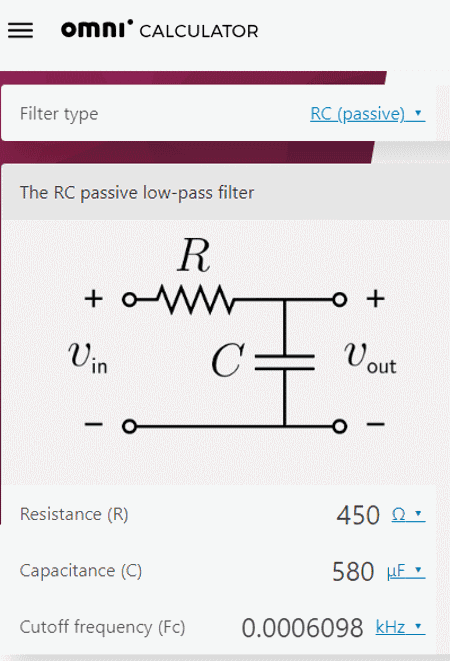
omnicalculator.com is another free online RC filter calculator website. Through this website, users can calculate the parameters of the RC passive low pass filter. It is capable of calculating the Resistance, Capacitance, and Cutoff Frequency of an RC filter. It also explains the RC low pass filter and shows a basic RC filter diagram. Before starting the calculation process, users can also choose to adjust the units of RC filter parameters. Now, follow the below steps.
How to perform RC filter calculation online using omnicalculator.com:
- Visit this website and open up the Low Pass Filter Calculator.
- Now, select RC (passive) option from the Filter type.
- Next, enter any two RC filter parameters to calculate the third one.
- Finally, specify their SI units and view the calculated parameters.
Additional Features:
- This website also offers associated calculators like RL, Inverting op-amp, and non-inverting op-amp.
- It also contains calculators covering calculators associated with fields like biology, chemistry, ecology, finance, math, and more.
Final Thoughts:
It is another good RC filter calculator website that offers all the tools to calculate all three parameters of an RC filter.
| Pros | Cons |
|---|---|
| Can calculate all three parameters of an RC filter | |
| Shows RC filter diagram | |
| Explains RC low pass filter |
learningaboutelectronics.com
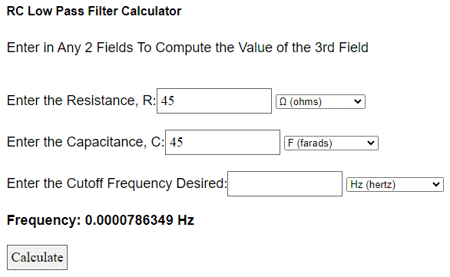
learningaboutelectronics.com is another free online RC filter calculator website. Through this website, users can calculate all three (Resistance, Capacitance, and CutOff Frequency) parameters of RC low-pass filters. This website also shows an RC low pass filter diagram and cutoff frequency graph. The process to perform the RC filter calculation is also quite simple. Now follow the below steps.
How to perform RC filter calculations online using learningaboutelectronics.com:
- Go to this website and access the RC Low Pass Filter Calculator.
- Now, enter the values of any two RC filter parameters to calculate the third one.
- Next, specify the SI units of input parameters.
- Finally, click on the Calculate button to view the calculated value.
Additional Features:
- This website also comes with additional online tools such as RL Low Pass Filter Calculator, Inverting Op Amp Low Pass Filter Calculator, Noninverting Op Amp Low Pass Filter, and more.
Final Thoughts:
It is another good online RC filter calculator website that helps users calculate the Capacitance, Resistance, and CutOff frequency of an RC low pass filter.
| Pros | Cons |
|---|---|
| Calculates all three parameters of a low-pass RC filter | |
| Shows calculation formulas and an RC filter diagram |
trance-cat.com
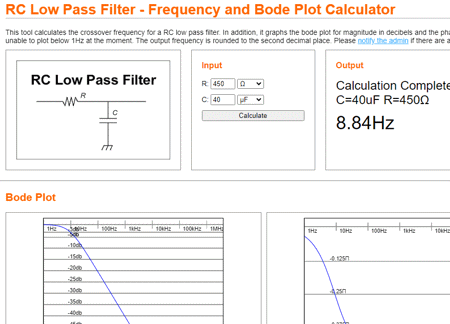
trance-cat.com is another free online RC filter calculator website. Through this website, users can calculate the cutoff frequency of RC low-pass filters. To do that, it only needs Resistance and Capacitance values. Before starting the calculation process, users can also choose to specify the SI units of both resistance and capacitance values. Besides this, it also shows an RC low pass filter diagram and plots a Bode plot graph. Now, follow the below steps.
How to perform RC filter calculation online using trance-cat.com:
- Visit this website using the given link.
- After that, enter Resistance and Capacitance values and specify their SI units.
- Next, click on the Calculate button to view the calculated cutoff frequency in hertz.
Additional Features:
- On this website, users also get additional circuits and filter calculators such as RL low pass filter, RL high pass, RF power density, free space path loss, and more.
Final Thoughts:
It is another good online RC filter calculator website that anyone can use to calculate the cutoff frequency of an RC filter.
| Pros | Cons |
|---|---|
| Shows RC low pass filter diagram | Only calculates the cutoff frequency |
| Generates Bode plot graph |
muzique.com
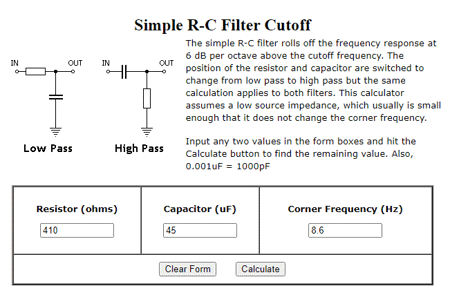
muzique.com is the last free online RC filter calculator website. This website comes with a simple R-C filter cutoff calculator. Through this calculator, users can calculate all three RC filter parameters namely Resistor, Capacitor, and Corner Frequency. Although, it doesn’t let users adjust the SI units of RC filter parameters. It also shows RC low pass and RC high pass filter diagrams. Now, check out the below steps.
How to perform RC filter calculation online using muzique.com:
- Visit this website and access the Simple R-C Filter Cutoff.
- Now, enter any two RC filter parameters to calculate the third one.
- Next, click on the Calculate button to start the calculation process.
- Finally, view the calculated value.
Additional Features:
- This website also comes with additional online tools such as decibels to voltage gain calculator, voltage gain to decibels converter, and more.
Final Thoughts:
It is another capable online RC filter calculator website that can calculate all three parameters of an RC filter.
| Pros | Cons |
|---|---|
| Can calculate all three parameters of an RC filter | |
| Shows high pass and low pass RC filter |
Frequently Asked Questions
Selecting the values for an RC (Resistor-Capacitor) filter involves determining the resistor (R) and capacitor (C) values that will give you the desired filter characteristics, such as the cutoff frequency (fc) and filter order.
To calculate the values for an RC (Resistor-Capacitor) low-pass filter, you need to determine the resistor (R) and capacitor (C) values that will give you the desired cutoff frequency (fc) and filter order. A low-pass filter allows low-frequency signals to pass through while attenuating higher frequencies. Here are the steps: First, determine your design requirements. Now, select the filter order. Next, calculate the time constant. Now, select either resistor or capacitor. Choose standard component values. Finally, verify the design.
RC (Resistor-Capacitor) filters are used in electronic circuits for several important purposes due to their ability to selectively pass or block certain frequencies in electrical signals. Here are some common reasons why RC filters are used: Signal Conditioning, Frequency Selection, Noise Reduction, Power Supply Decoupling, etc.
Whether an LC (Inductor-Capacitor) filter or an RC (Resistor-Capacitor) filter is better depends on the specific requirements and characteristics of the application. Each type of filter has its own advantages and limitations, and the choice between them should be based on the desired filter performance and the constraints of the particular circuit or system.
An RC (Resistor-Capacitor) filter doesn't have a specific "material" like some electronic components do. Instead, it's composed of two fundamental passive electronic components: a resistor (R) and a capacitor (C). These components are typically made of various materials depending on the specific application and design requirements.
Naveen Kushwaha
Passionate about tech and science, always look for new tech solutions that can help me and others.
About Us
We are the team behind some of the most popular tech blogs, like: I LoveFree Software and Windows 8 Freeware.
More About UsArchives
- May 2024
- April 2024
- March 2024
- February 2024
- January 2024
- December 2023
- November 2023
- October 2023
- September 2023
- August 2023
- July 2023
- June 2023
- May 2023
- April 2023
- March 2023
- February 2023
- January 2023
- December 2022
- November 2022
- October 2022
- September 2022
- August 2022
- July 2022
- June 2022
- May 2022
- April 2022
- March 2022
- February 2022
- January 2022
- December 2021
- November 2021
- October 2021
- September 2021
- August 2021
- July 2021
- June 2021
- May 2021
- April 2021
- March 2021
- February 2021
- January 2021
- December 2020
- November 2020
- October 2020
- September 2020
- August 2020
- July 2020
- June 2020
- May 2020
- April 2020
- March 2020
- February 2020
- January 2020
- December 2019
- November 2019
- October 2019
- September 2019
- August 2019
- July 2019
- June 2019
- May 2019
- April 2019
- March 2019
- February 2019
- January 2019
- December 2018
- November 2018
- October 2018
- September 2018
- August 2018
- July 2018
- June 2018
- May 2018
- April 2018
- March 2018
- February 2018
- January 2018
- December 2017
- November 2017
- October 2017
- September 2017
- August 2017
- July 2017
- June 2017
- May 2017
- April 2017
- March 2017
- February 2017
- January 2017
- December 2016
- November 2016
- October 2016
- September 2016
- August 2016
- July 2016
- June 2016
- May 2016
- April 2016
- March 2016
- February 2016
- January 2016
- December 2015
- November 2015
- October 2015
- September 2015
- August 2015
- July 2015
- June 2015
- May 2015
- April 2015
- March 2015
- February 2015
- January 2015
- December 2014
- November 2014
- October 2014
- September 2014
- August 2014
- July 2014
- June 2014
- May 2014
- April 2014
- March 2014

